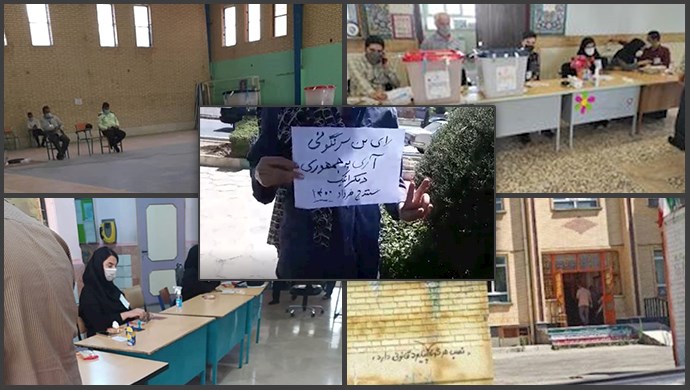Analysis by PMOI/MEK
Iran, June 19, 2021—As was expected, Iran’s sham presidential election, held on Friday, turned out to be a farce and a humiliation for the tyrannical regime of the mullahs. According to information obtained by the People’s Mojahedin Organization of Iran (PMOI/MEK), less than 10 percent of eligible voters cast their ballots, which displays the Iranian people’s utter contempt for the regime in its entirety.
#Iran opposition PMOI/MEK report on #BoycottIranShamElections
Voter turnout: Less than 10%
-1,200 reporters of @simayazaditv from 400 cities across Iran
-Over 3,500 video clips as proof, presentable to the public & any international entity/organizationhttps://t.co/Jd586NYslc
— People’s Mojahedin Organization of Iran (PMOI/MEK) (@Mojahedineng) June 19, 2021
The Iranian Resistance documented the process closely. According to a statement by the National Council of Resistance of Iran (NCRI), more than 1,200 journalists and reporters of Simay-e-Azadi TV (The Iranian Resistance Satellite TV channel, AKA, IranNTV) from 400 cities in Iran and more than 3,500 sent video clips and reports that showed empty polling stations.
The evidence was so undeniable that even international media outlets that tend to cast a positive light on the Iranian regime’s elections acknowledged the apathy among voters.
The mass boycott of the elections happened while regime leaders pleaded for the public to go out and vote on several occasions. Regime supreme leader Ali Khamenei described the election as a “national exam.” Other senior officials from all factions of the regime begged the people to vote, described it as a necessity for national security. A Friday prayer leader explicitly said that those who don’t vote are “voting for the MEK.”
The regime resorted to other tactics such as buying votes, handing out free food and accessories, and other incentives to encourage the people to come to the polling stations. But the people didn’t buy into such ruses.
The mass boycott of the election was a decisive vote for regime change and proof that the people of Iran reject all factions within the regime.
As many Iranians openly said during the runup to the elections, “My vote is regime change.”
Mrs. Maryam Rajavi, the President-elect of the NCRI, described the nationwide boycott of the sham election as “the greatest political and social blow to the mullahs’ Supreme Leader Ali Khamenei and the ruling theocracy and worthy of a historic congratulation to the people of Iran.” She added that the boycott proved and showed the world that “the Iranian people’s only vote is to overthrow this medieval regime.”
A Historic congratulation to the Iranian people on the nationwide boycott of the mullahs’ sham election; the greatest political & social blow to Khamenei & the ruling theocracy. The world saw that the Iranian nation voted for this regime’s overthrow. #Iranhttps://t.co/MO6uGjwzSq
— Maryam Rajavi (@Maryam_Rajavi) June 18, 2021
Iran’s president is a mass murderer
The regime has nonetheless resorted to its usual tactic, which is to use its state-controlled media to create an impression of high voter turnout. The state-run media declared more than 28 million of 59 million eligible voters cast their ballots.
Unsurprisingly, the declared winner of the regime’s elections masquerade turned out to be Ebrahim Raisi, Khamenei’s favored candidate. Raisi has spent his entire career in the regime’s judiciary system and was the head of the judiciary branch before becoming president.
But one thing stands out in his four-decade service to the Iranian regime: the 1988 massacre of political prisoners. Under a fatwa by then-supreme leader Ruhollah Khomeini, the regime carried out a mass purge in Iran’s prisons, executing more than 30,000 political prisoners in the span of a few weeks. Raisi played a key role in this crime against humanity. As the deputy prosecutor of Tehran, Raisi became a member of the “death commission,” a group of so-called judges who summoned the political prisoners and sent them to the gallows if they did not repent their support for the MEK. He is known among Iranians as the “henchman of 1988.”
During his time as the judiciary chief, Raisi ratcheted up a crackdown on protesters and dissidents. Executions have continued unabated. The torture of political prisoners has intensified. Two stark examples are Navid Afkari and Mostafa Salehi, arrested protesters who were executed despite international outcry to revoke their death sentence. In separate reports, the MEK and Amnesty International have given harrowing accounts of atrocities taken place against protesters arrested during the November 2019 protests.
Raisi has been blacklisted by the U.S. for his human rights abuses.
Iran’s regime unmasked
But why would Khamenei appoint an executioner as his president? Wouldn’t a so-called moderate figure be more suited to take the helm at a time that the regime is engaged in negotiations to lift international sanctions?
While such tactics might have worked in the past, the regime is in a state that it can no longer tolerate such political and diplomatic maneuvers. The regime is faced with an increasingly restive society. At any moment, another nationwide protest might erupt, and Khamenei can only trust someone who has a track record of cracking down on dissent. And no one fits the bill better than Raisi.
What does the election mean for the international community? First, it proved for the umpteenth time that reform within the regime is a fiction, a reality that the Iranian Resistance has reiterated time and again. While the proponents of the appeasement policy toward the Iranian regime had justified their actions (or lack thereof) by claiming they wanted to empower the so-called moderate faction within the regime, they are now faced with an unmasked regime, one whose president a mass murderer who has the blood of tens of thousands of innocents on his hands.
And second, the elections and its mass boycott is undeniable proof that the mullahs’ regime does not represent the people. The people of Iran have cast their vote: regime change. It is now time for the international community to cast theirs and choose to stand on the right side of history.





